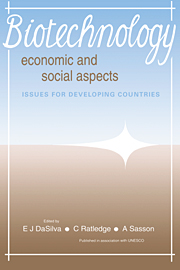Book contents
- Frontmatter
- Contents
- List of contributors
- Preface
- 1 Biotechnology: the socio-economic revolution? A synoptic view of the world status of biotechnology
- 2 Bioethanol production: economic and social considerations in failures and successes
- 3 Biofertilizers: agronomic and environmental impacts and economics
- 4 Microalgal biotechnology: is it an economic success?
- 5 Production of useful biochemicals by higher-plant cell cultures: biotechnological and economic aspects
- 6 Mushroom production – an economic measure in maintenance of food security
- 7 The economic viability of Single Cell Protein (SCP) production in the twenty-first century
- 8 The impact of biotechnology on international commodity trade
- 9 Biotechnology: socio-economic considerations, intercultural perspectives and international viewpoints
- 10 Joint microbial biotechnological ventures in developing countries: social promises and economic considerations
- 11 The economic and social implications of gene technology to developing countries
- 12 Making biotechnology appropriate – and environmentally sound
- 13 Information support for research and development in biotechnological applications
- 14 The effects of emerging biotechnologies on plant and animal agriculture – a viewpoint
- Index
9 - Biotechnology: socio-economic considerations, intercultural perspectives and international viewpoints
Published online by Cambridge University Press: 04 August 2010
- Frontmatter
- Contents
- List of contributors
- Preface
- 1 Biotechnology: the socio-economic revolution? A synoptic view of the world status of biotechnology
- 2 Bioethanol production: economic and social considerations in failures and successes
- 3 Biofertilizers: agronomic and environmental impacts and economics
- 4 Microalgal biotechnology: is it an economic success?
- 5 Production of useful biochemicals by higher-plant cell cultures: biotechnological and economic aspects
- 6 Mushroom production – an economic measure in maintenance of food security
- 7 The economic viability of Single Cell Protein (SCP) production in the twenty-first century
- 8 The impact of biotechnology on international commodity trade
- 9 Biotechnology: socio-economic considerations, intercultural perspectives and international viewpoints
- 10 Joint microbial biotechnological ventures in developing countries: social promises and economic considerations
- 11 The economic and social implications of gene technology to developing countries
- 12 Making biotechnology appropriate – and environmentally sound
- 13 Information support for research and development in biotechnological applications
- 14 The effects of emerging biotechnologies on plant and animal agriculture – a viewpoint
- Index
Summary
Introduction
Following the discoveries of vaccines, anti-toxins and antibiotics, microbial biotechnology over the past few decades has proven itself as a creatable resource. With the advent and use of new research skills, it is giving rise to further new industries and ventures. All pervasive on the commercial front and defying monopolization by any one group or society for extended periods of time, the products of microbial technology are used by all from presidents and royalty to the poor and the underprivileged.
The potential of the microorganism for socio-industrial advancement and growth is legion and legend. Solvents, chemicals and bioenergy result from anaerobic fermentation, i.e. acetone, butanol, and methane. Food additives, dairy products and enhanced-oil-recovery result from the use of microbial polysaccharides. The potential for food, feed and ethanol production from waste cellulosic materials via microbial action in bioconversion technologies exists. Textured and flavoured mycelial food products that simulate veal and chicken have been produced. Microbial production of psychoactive and immunoactive components is a reality. Microbial synthesis of interferons, rennet and growth hormones is no longer a remote possibility. Underpinning all these processes in their transition from the laboratory-scale to the industrial stage are three indisputable determinants – society, culture and economics.
The past decade, has also been witness to fundamental changes in the biosciences. New vistas in molecular biology and human health have been opened by the techniques of genetic engineering using restriction endonucleases resulting in the development of bioactive entities now being produced in quantity using microorganisms as the producing agencies.
- Type
- Chapter
- Information
- Biotechnology: Economic and Social AspectsIssues for Developing Countries, pp. 189 - 234Publisher: Cambridge University PressPrint publication year: 1992
- 1
- Cited by



